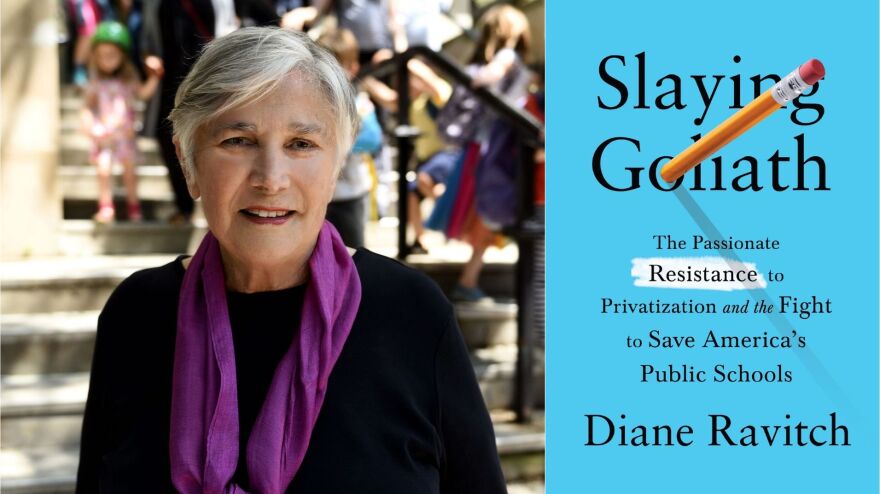For the last two decades, Florida has been a laboratory for school choice policies: alternatives to public education like privately-run charter schools and taxpayer-funded scholarships to private institutions.
Diane Ravitch argues that’s not something to celebrate or emulate.
Ravitch is a historian, advocate and former assistant education secretary under Republican President George H. W. Bush. She once believed charters, vouchers and standardized testing could improve public school education.
“I came to realize that the privatization movement was a continuation of a decades-long campaign by right-wingers who hated public schools, which they derisively called ‘government schools,'” she wrote of her personal evolution in her new book, Slaying Goliath: The Passionate Resistance to Privatization and the Fight to Save America’s Public Schools.
“I renounced my own past views and determined to expose the well-funded smear campaign against American public schools and their teachers,” she wrote.
Ravitch will participate in a conversation with United Teachers of Dade president Karla Hernandez-Mats at 6:30 p.m. Monday at Books & Books in Coral Gables.
Ahead of her Miami stop, Ravitch spoke with WLRN about Florida’s role in the national education landscape. Here’s an excerpt of that conversation, which has been edited for length and clarity:
WLRN: There’s a chapter in the book called “The Miracles that Weren’t: New Orleans and Florida.” In it you write, “[Former Florida Governor] Jeb Bush and [U.S. Secretary of Education] Betsy DeVos point to Florida as a model of the success of school choice strategies. It might be more apt to point to Florida as a model of lawlessness and greed.” What makes Florida a model of lawlessness and greed?
RAVITCH: Florida is one of the most corrupt states in the country when it comes to education. I've read the reports of a group called Integrity Florida, which is in government ethics watchdog. I read the reports of the Florida League of Women Voters, and when they write about charter schools, they write about the blatant conflicts of interests of the people in the Florida Legislature.
They write about the fact that the current state commissioner of education, who has no education background whatsoever, that his wife runs a charter school. They've identified people in the Legislature who have a direct financial interest in charter schools and who write and vote on laws that will benefit themselves and their family members. I find this appalling. I find it corrupt.
The most powerful people in Florida state government often argue Jeb Bush’s policies two decades ago completely turned around education here. Florida’s public schools were among the worst in the country when Jeb Bush took office. And now Florida students are some of the highest performers on national and international standardized tests.
How would you explain that success, if it’s not for the education policies that have been pursued over that period of time?
Florida benefits on its fourth grade scores by holding back third graders who have low test scores. The ones who pass the third grade test are tested in fourth grade, and that makes the scores inflated. By the time kids get to eighth grade, Florida's scores are mediocre. Florida is no model for the nation. If we all want to be mediocre, then we should follow the Florida path.
Miami-Dade County Public Schools has been recognized nationally as a district that has really embraced school choice. It’s also been a high performer among urban school districts in the country. Many students in Miami-Dade County leave their neighborhoods to go to magnet schools or other specialized programs. Republicans [and] school choice advocates often say that competition from charter schools has made traditional public school better or make their offerings better.
Well, Miami may be an outlier, but that's not true anywhere else in the country. That theory was applied in Detroit and virtually destroyed what was left of the Detroit Public Schools. Competition led to no improvement. And Detroit is still the lowest performing district in the country.
One of the other very low performing districts is Milwaukee, and Milwaukee embraced the theory of competition and choice. They have a charter sector, a voucher sector and a public sector, and they're all doing terribly. So if the theory is right, it should work wherever it's applied, not just in one place.
So I don't think that Miami is an example that proves the case, because it's an outlier.






